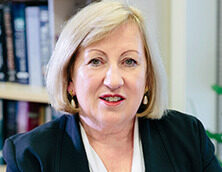Glass half full: cell drinking and growth in harsh microenvironments

TIME: 1:00pm
WHEN: 8 October, 2025
LOCATION: Zoom
TIMEZONE: AEST
Glass half full: cell drinking and growth in harsh microenvironments
Speaker: Professor Jennifer Stow
Date: Wednesday 08 October, 1pm – 2pm AEST
Zoom: Click here to join the seminar
Abstract:
Cancer cells acquire a growth advantage through constitutive activation of macropinocytosis for fluid and nutrient uptake, particularly in hypoxic and nutrient-depleted tissue microenvironments. Single cell organisms similarly enhance macropinocytosis as an adaptation for survival in water or nutrient-depleted landscapes. Targeting macropinocytic regulators to promote or inhibit macropinocytosis is potentially a strategy for delivering therapeutics to cancer cells or blocking cancer growth, and in single cell organisms, for monitoring environmental contaminants. Recent studies on Rab GTPase regulation of macropinocytosis in cancer cell 3D environments will be discussed. New quantum approaches are being sought for probing the properties of cell membranes and cancer microenvironments to modulate cell drinking for nutrient uptake. We aim for future translation of these approaches in cancer and landscape monitoring.
Bio: Professor Jennifer Stow is a molecular cell biologist, an NHMRC Leadership Fellow and head of the Protein Trafficking and Inflammation research laboratory in The University of Queensland’s Institute of Molecular Bioscience (IMB). Her previous leadership appointments include as Division Head and Deputy Director (Research) at IMB (12 years) and she currently serves on national and international advisory boards, editorial boards and steering committees, and as an elected Associate Member of the European Molecular Biology Organisation (EMBO).
Jenny received her undergraduate and PhD qualifications at Melbourne’s Monash University before undertaking postdoctoral training in the Department of Cell Biology at Yale University School of Medicine, USA. With training as a microscopist in kidney research, she gained further experience at Yale as a postdoc in the lab of eminent cell biologist and microscopist, Dr Marilyn Farquhar, where protein trafficking was both a theme and a passion. Jenny then took up her first faculty appointment as an Assistant Professor in the Renal Unit at Massachusetts General Hospital (MGH) and Harvard Medical School in Boston USA, where her research uncovered new roles for a class of enzymes, GTPases, in regulating trafficking within cells. At MGH her research also formed part of a highly successful NIH Renal Cell Biology Program. In late 1994, Jenny moved her research lab back to Australia, to The University of Queensland, in late 1994 as a Wellcome Trust International Medical Research Fellow. As part of IMB since, the Stow lab has continued a focus on protein trafficking, including pioneering live-cell imaging, to spearhead their work on trafficking in inflammation, cancer and chronic disease. Major discoveries include identifying new proteins and pathways for recycling adhesion proteins in epithelial cells, inflammatory cytokine secretion in macrophages and immune signalling through Toll-like receptors in inflammation and infection. Small GTPases of the Rab family, signalling adaptors and kinases feature among the molecules studied in the Stow lab for their functional roles and their potential as drug targets in inflammation and cancer. A keen focus is to understand the role of the fluid uptake pathway, macropinocytosis, in controlling inflammation, cancer and mucosal absorption.
Professor Stow has been awarded multiple career fellowships including from American Heart Association, Wellcome Trust and NHMRC. She has published >200 papers, cited over 15,500 times and she is the recipient of awards and honours, most recently including the 2019 President’s Medal from the Australia and New Zealand Society for Cell and Developmental Biology. She is also academic head of IMB Microscopy, a world-class fluorescence microscopy and image analysis facility. Her research is funded by a variety of agencies and industry partnerships, in addition to NHMRC and ARC, including through the ARC Centre of Excellence in Quantum Biotechnology, QUBIC. The Stow lab work with national and international collaborators and welcome students and postdoctoral trainees to participate in their research. We value having a diverse, inclusive, and supportive culture for research and celebrate the many diverse and wonderful successes of Stow lab alumni.
Email CoordinatorView all events